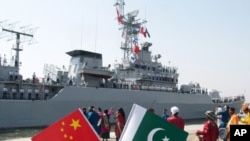Anti-terror allies Pakistan and the United States are struggling to mend their often uncomfortable relationship which has been strained by the secret U.S. raid that killed Osama bin Laden in Abbottatad, Pakistan.
Now, it appears Pakistan is looking to its northern neighbor, China, for support.
On Tuesday, Pakistani Prime Minister Yousef Gilani kicked off a four-day visit there, describing Beijing as Islamabad's "best and most trusted friend." He also pointed out that China was the first country to show its solidarity with Pakistan after the killing of bin Laden.
Mr. Gilani's trip was scheduled weeks ago to mark the 60th anniversary of diplomatic relations between the two countries.
Pakistan and China have always been close, says Dr. Ehtisham Ahmad, a senior research fellow at the London School of Economics' Asia Research Center. He explained why in an interview VOA's JulieAnn McKellogg.
"Initially, Pakistan was China’s sort of lifeline, and thee eyes and ears to the rest of the world. And they facilitated the break through with the Kissinger visit and then, the Nixon visit in the early 1970s. So they played a major role in the normalization of the relationship with the West and the United States, in particular. This relationship has been changing over time. It’s sort of cooled down a bit.
|
Listen to the interview with Dr. Ahmad here
|
I think it’s been revived in recent years as China has taken a more dominant economic role, and sees how Pakistan is not only an opening to the Middle East, providing access to the Port of Gauthier in particular, but also as a bulwark against perhaps India. And on Pakistan side, it has been a very close relationship and they have relied on the Chinese for technical assistance as well as financial support in times of crisis. Tey do see the Chinese perhaps as an ‘all-weather friend.'”
What does this mean for the United States, especially in the wake of the killing of Osama bin Laden?
"'Tthere is no way that China will supplant the United States despite the trust deficit, which now exists in the Pakistan-U.S. relationship, which is quite understandable. The United States is a major both military and economic purveyor of support to Pakistan, and I don’t think the Chinese can fully fill that role though the Pakistan government is obviously trying look to shore up its bases of support in the event that there is a complete breakdown in its relationship with the United States. I really don’t think it will come to that because the United States needs Pakistan and Pakistan needs the United States. It’s a marriage of convenience, in a sense. [Pakistani President Asif Ali] Zadari went to Moscow immediately following the bin Laden event. And now the prime minister is going to China. So they are really trying to see the alternative areas of support."
The U.S. and Pakistan have such a strong military relationship, but what about China and Pakistan? China has supplied weapons to Pakistan, and they also have a nuclear relationship.
"Yes, I believe that is the case. And the Chinese have seen Pakistan as sort of counterweight to other powers. I mean, the United States, India. And there is no territorial dispute. I think Pakistan is the one country in the vicinity of China that they can totally rely on. So you they have sort of dubious relations with a number of there other neighbors: Koreans, Japanese, Vietnamese, Indians. They do see Pakistan as an opening to a very important part of the world, which is an opening to the oil-rich region of the Middle East. I would say it’s strategic convenience. You can think of it like a big aircraft carrier stationed in the Middle East."
What makes them so reliable?
"I think it’s a confluence of interests. They have got no sources of friction and they both need each other. I think if the United States' relationship is a marriage of convenience, this is one where they both want to cohabit in a sense. So, it’s both economic and military and strategic for both."
What does this mean for India? They are another key player. And the United States and India continue to strengthen their relationship.
"And the consequence of that is that China and Pakistan have strengthened their relationship, which had cooled down, you know, a few years ago when China started normalizing its relationship with India. I think in the long run, Pakistan needs to think about burying the hatchet with India. Sort of in the way China has with Taiwan. They had more fundamental disagreements with Taiwan, but the economic relations between China and Taiwan are actually rather good. Whereas Pakistan’s dispute with India is sort of over the line of control in Kashmir, which is trivial in comparison with the dispute between China and Taiwan; and yet, they are stuck in 1947, and the economic ties are nonexistent between India and Paksitan. I think in the long run, it’s in Pakistan’s interest to forge a better relationship with India."
